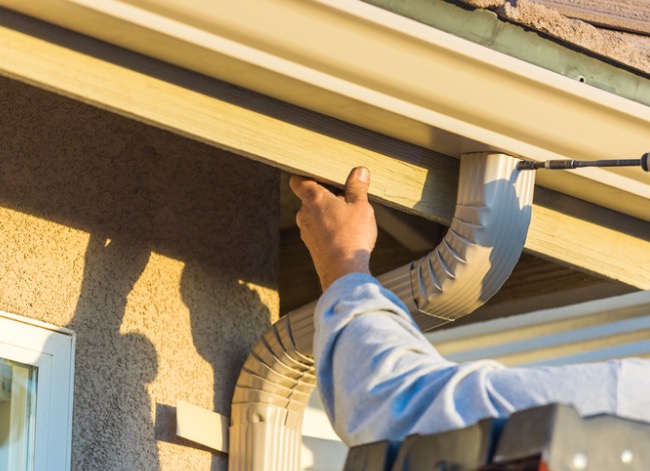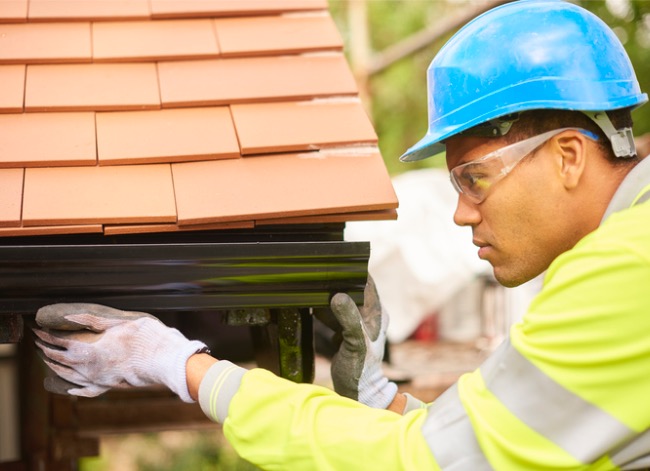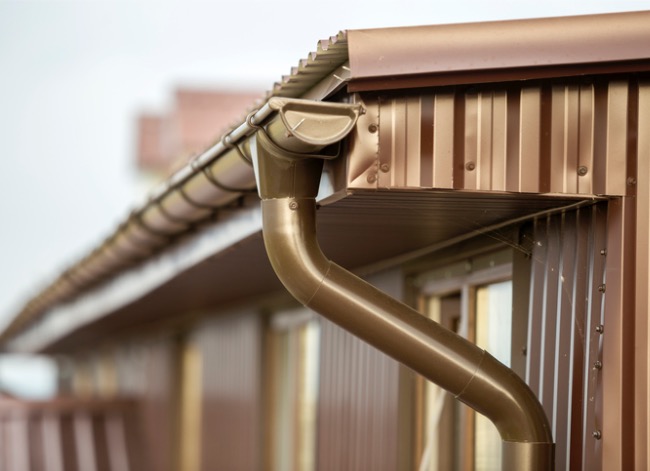We may earn revenue from the products available on this page and participate in affiliate programs. Learn More ›
Rain and snow can cause foundation problems if water is allowed to pool around the base of a home, but a gutter system can prevent these potential problems by redirecting water to a location further away from a home. However, before choosing and installing rain gutters it’s important to understand the different types, materials, shapes, sizes, and any gutter add-ons or accessories that can improve the functionality of house gutters and protect a home from water damage.
When shopping for a gutter system, a homeowner will be able to choose among a variety of materials, including aluminum, galvanized steel, vinyl, copper, and wood. Installers price gutter systems per linear foot, but this should include all the necessary components for a gutter system, including the gutters, downspouts (the vertical section), corner joints, end caps, and hanging brackets.
The Parts of a Gutter System
There are several gutter options to choose from that create a consistent path for water to flow from the roof to an area on the ground that is away from the foundation of a home. Common parts of a rain gutter system include end caps, gutters, elbows, downspouts, splash blocks, and conductor heads.
- End caps are used to block the flow of water at the end of the gutter run. They are typically used in place of elbow pieces when the gutter system doesn’t need to run along the outside of the entire roof.
- Gutters are the horizontal pieces that make up the bulk of the gutter system. They run alongside the roof in order to catch falling rain and running water.
- Elbows are installed between two perpendicular gutter runs in order to redirect water around the corners of the roof.
- Downspouts are vertical pieces of enclosed gutter pipe that run from the roof to the base of the home, releasing water onto a splash block to redirect the flow away from the home.
- Splash blocks are the last components in basic gutter systems that sit below the outlet of the downspout for the purpose of catching and redirecting the flow of water to an area away from the home.
- Conductor heads are commonly used in areas that get a large amount of rain on a yearly basis. They sit about halfway down the drainpipe and provide an overflow basin to help manage a high volume of water without spilling water from the gutters above.
Gutter Materials and Pricing
Aluminum
Aluminum is the most popular gutter type on the market, as it is relatively inexpensive, durable, and easy to work with. Unlike steel, aluminum will not rust over time and is available in a wide range of colors. Gutter installers will often quote a price (which includes installation) at a “per linear foot” price. Although costs for an aluminum system will vary, homeowners may expect to pay somewhere around $3 to $6 per linear foot.

Steel
Steel gutter systems are usually galvanized, although stainless steel options exist as well. Galvanized steel gutters will need replacement when they eventually rust after 20 to 25 years, but steel is strong and durable, making it a popular option for regions that experience extreme weather, heavy rains, and snow. Steel is slightly more expensive than aluminum, with prices averaging around $8 to $10 per linear foot. Stainless steel, which doesn’t rust, sells for upwards of $20 per linear foot.
Copper
Copper is also one of the more durable gutter options. Copper brings a certain aesthetic to a home’s facade, appealing to property owners looking to customize their home. “Copper is one of the strongest metals,” says Mike Milliman, a partner with the RainTrade Corporation. “It is suitable for any region.”
Copper sits at the high-end of the gutter market, selling for anywhere from $12 to $25 per linear foot. Homeowners who are interested in a copper gutter system may want to consider the “patina” aspect of copper, which is how it gradually ages and changes color with exposure to the elements. “A copper gutter system will only stay shiny for the first month or two,” Milliman says. “It will turn brown, dark brown, purple, and eventually a greenish color. Homeowners need to expect these changes.”
Vinyl
Vinyl is one of the least-expensive gutter options on the market and is also very easy to cut and work with, making these gutters suitable for DIY installations. Vinyl gutter systems are prominent in home stores because of the ease of assembly and availability of component parts. At around $3 to $5 per linear foot, vinyl is the most affordable option and helps lower the costs to install gutters. Vinyl tends to become brittle and break in colder climates. It is also not as sturdy or durable as metal counterparts, so watch out for common signs that you need new gutters.
Shape, Size, Seamless
Homeowners will have two main gutter shapes to choose from: half-round and K-style. A smaller K-style gutter will drain the same amount of water as a larger half-round gutter. Half-round (also called U-shape) gutters are typically considered a traditional shape, as this was the original gutter shape dating back to the early 1900’s. K-style gutters didn’t emerge as an option until around the 1950s. Downspouts generally come in round or rectangular shapes.
When it comes to size, a homeowner will have to choose from gutter size (the measurement of the top opening), downspout size (length and width or diameter), and thickness. The most common gutter sizes are 5 inches and 6 inches, although 4 inches is available as well. Downspouts are commonly 2 x 3 inches and 3 x 4 inches in size or 3 or 4 inches in diameter.
When determining the size of a home’s gutter system, a homeowner should consider the area’s rainfall density. Such facts can usually be found on gutter supply websites. A home that sees a lot of rain or has a steep roof pitch should have a larger gutter system. Similarly, a home surrounded by tall trees will need a larger system to accommodate falling leaves without clogging.
Thickness is rated differently, depending on the material used. A thicker gutter system will be sturdier, more durable, and more expensive. Aluminum systems range from .019 to .032 inches in thickness. Copper is usually rated in weight, with a heavier weight indicating greater thickness. It is common to see 16-ounce and 20-ounce options for copper systems. Steel may be rated in inch-thickness or gauge.
Finally, a homeowner will have to decide between a sectional or seamless system. Traditionally, gutters came in sections that had to be pieced together, leaving seams. Today’s aluminum sectional systems require gutter sealant at the seams to prevent leakage. This sealant usually has to be re-applied as regular maintenance. Sectional copper or steel systems are actually soldered together at the seams, eliminating the need for a sealant. Proper installation of a sectional copper or steel system should include soldering, although some installers will use a metal sealant. Seamless systems are growing in popularity, and require professional installers. In a seamless system, an installer will use a special machine on-site to form long stretches of gutter (usually copper or aluminum) that will run the length of the roofline without a seam.

Proper Pitch
Gutter installation should follow a couple of basic rules. Gutters must be pitched so water will flow to the downspouts. The rule of thumb for this slope is a vertical 1/2 inch for every 10 feet of horizontal run. If the run is more than 35 feet long, some specialists recommend installing the high point of the system in the middle and sloping the gutter downward in both directions to downspouts on both ends of the run. Water exiting the downspout must always be directed away from the foundation.
Is gutter installation a DIY job, or a job for a pro?
Gutter systems need to be installed on the house where the angle of the roof would direct rain, snow, and flowing water in order to catch and redirect the water to an appropriate spot away from the home for the purpose of protecting and preserving the foundation. Installing a gutter system requires multiple people with experience working on a ladder, as well as an adequate ability to measure, seal, and secure a horizontal and vertical trough at an appropriate angle to receive and redirect water.
Common tools for this job include a tape measure, a ladder, sealant, a drill or rivet gun, and an angle grinder to cut pieces to the correct length and angle. While this process may seem daunting, it’s essentially just building an interconnected path around the roof of the home, so it can be completed by experienced DIYers. However, if you aren’t comfortable working on ladders then it’s best to trust this job to a professional installation company, especially if the home is taller than a single story.

Gutter Accessories
The gutter industry has seen an explosion in the accessory side of the business. Rain chains, gutter foam, decorative boots, and rain barrels are some of the most popular options to improve the function and appearance of a gutter system.
- Rain chains are decorative add-ons that take the place of traditional downspouts. They typically consist of a chain that directs the flow of water down to the ground, but they may also have several small cups along the length of the chain or even a large catch-basin at the bottom of the chain.
- Gutter foam is designed to sit inside the gutter in order to prevent sticks, leaves, and other large debris from falling into the gutters and clogging them.
- Decorative boots, as the name implies, are purely an aesthetic choice. They have a unique shape or pattern that turns the base of the downspout into a decoration for the home. These accessories have a wide range of shapes, sizes, and decorative designs, allowing DIYers to customize their homes.
- Rain barrels are a great way to collect and use the rainwater for watering the lawn, garden, or indoor plants instead of just directing the water away from the home. They take the place of a splash block, acting as a large water collection system that’s ideal for conserving water.

Gutter Maintenance
While a gutter system is a great addition to any home to keep the foundation protected, it does require semi-regular maintenance to ensure that the system doesn’t form a leak, get clogged, or become overloaded. At least twice per year it’s necessary to climb a ladder to access the gutters with a gutter shovel or a trowel in order to clean out any leaves, sticks, animal feces, or other debris that has accumulated in the gutter. Inspect the gutters on a monthly basis and after any large storms to clear clogs before they become a problem.
If the gutter has too much debris in it, the additional weight can cause the gutter to pull away from the roof, breaking the fasteners and causing the collapse of the entire system. Help avoid clogs and debris accumulation with gutter guards that sit over the top of the gutter to block large debris, like sticks and leaves, from entering the gutters. A common example of this protective device is gutter foam, which has a triangular shape that sits inside the gutter, blocking the top of the gutter system, while allowing water to flow through the bottom unhindered by large debris.
Rain Gutters’ Eco Impact
The addition of a gutter system is intended to protect the home and preserve the structural integrity of the foundation. This purpose prevents the premature breakdown of housing materials and reduces waste. However, gutter systems come in a range of materials and not every option is eco-friendly.
Vinyl gutters in particular are inexpensive options, but they only last about 10 years before needing to be replaced. While their low cost appeals to consumers, these gutters cause a negative impact on the environment. It’s better to opt for recyclable, sustainable options such as steel, aluminum, or copper gutters that will last between 20 to 50 years.
One thing that is eco-friendly about gutters is that they can lead to water catchment systems, like rain barrels. These barrels collect the rainwater for use around the home, instead of simply allowing the water to drain away. This water conservation effort is a great option for avid gardeners who appreciate an earth-friendly way to keep their gardens hydrated, and save money on their water bill in the process.
FAQs About Gutter Systems for the Home
If there are still concerns or lingering questions about whether gutters are necessary, how they work, and gutter system installation, take a look at the answers to some of the most commonly asked questions about rain gutters below.
Q. How long do gutters last on a house?
Depending on the material and the quality of the installation, rain gutters can last from 10 years for vinyl gutters to 50 years for copper gutters. However, steel and aluminum gutters are the most common gutter materials. They last for about 20 years before needing to be replaced.
Q. Can I install gutters myself?
Gutters can be installed by experienced DIYers who understand how to work safely on a ladder or roof. Keep in mind that falls are one of the most common causes of injuries at home and in the workplace, so accidents can happen to anyone who is unprepared for the risks involved while installing gutters.
Q. Should gutters be painted the same as trim?
Whether the gutters are painted the same as the trim or the same as the roof is completely up to the homeowner. However, it is not advised to choose a completely different color from both the roof and the trim because it’s likely that the gutter system will stick out and disrupt the aesthetic of the home.
Q. Is it OK to not have gutters?
Gutters are a necessary feature that protect the foundation of a home from erosion and flooding. If a home doesn’t have gutters, it’s advised to install a gutter system to preserve the structural integrity of the building.
Q. Do I need gutters around my entire house?
The only reason to have a gutter system that surrounds the entire house is if the roof slants in every direction. However, if the roof only slants in two directions, then gutters are only required at the base of the slant to catch the water that is redirected down the angle of the roof.
Final Thoughts
Keep the foundation and ground around a home safe from erosion and flooding by adding a gutter system to the house that will catch and redirect rain, hail, sleet, snow, and running water from the roof to an area on the ground away from the base of the home. Choose from a variety of materials to meet your budgetary limitations, or make a choice based on the highest quality and longest life to outfit the home with a premium copper gutter system.
Take the time to learn the appropriate sizes, shapes, and features that are suitable for your gutter system before selecting the right parts to replace or install a new gutter system to protect your home.

